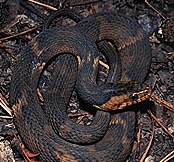|
|
 |
Department of Biology California State University, Northridge 18111 Nordhoff Street Northridge, California 91330-8303, USA Office: (818) 677-5737 FAX: (818) 677-2034 Office Location: Live Oak 1328 Email: jose.monzon@csun.edu |
|
|
 |
Department of Biology California State University, Northridge 18111 Nordhoff Street Northridge, California 91330-8303, USA Office: (818) 677-5737 FAX: (818) 677-2034 Office Location: Live Oak 1328 Email: jose.monzon@csun.edu |
Thesis Research
Temperature profoundly affects the biology of most organisms, but particularly reptiles, which regulate their body temperature behaviorally by shuttling between heat sources and sinks. Some reptiles select higher body temperatures after feeding, a behavior termed postprandial thermophily (PPT). Although rarely tested, this increase in body temperature is assumed to increase nutrient and energy assimilation and reduce meal retention time. Yet if PPT is beneficial to digestion, than why is it not ubiquitous in reptiles? My study tests the presumed benefits of PPT and the underlying mechanistic basis of these benefits in closely related species of watersnakes (Nerodia spp.). My objectives are to determine (1) the correlation between meal size and PPT, (2) the effects of PPT on passage rate (PR) and digestive efficiency (assimilable digestive coefficient, ADC), and (3) the temperature sensitivity of digestive enzymes, which addresses a likely mechanism underlying the digestive benefits of PPT. My experiments will be conducted on three species of watersnakes that have or lack PPT. To determine if PPT is elicited in proportion to meal size, snakes implanted with temperature-sensitive transmitters will be fed meals (goldfish) 10, 20, and 50% of their body mass and body temperatures selected in a thermal gradient will be recorded. To determine the effects of PPT on PR and ADC, snakes will be held in environmental chambers set at the body temperatures selected by fasted and fed individuals of each species. Meals will be marked prior to feeding to determine the evacuation time and feces and urates will be recovered for bomb calorimetry to compare PR and ADC between snakes with and without PPT. To identify the mechanism behind PPT, the in vitro activity of three ecologically relevant digestive enzymes will be measured at each of four temperatures to compare the temperature sensitivity of enzyme activity between species with and without PPT. In most analyses, individuals will be compared to themselves (body temperature unfed vs. fed) and species means will be used to test for differences between species with and without PPT. My study is the first to adopt a mechanistic approach to investigating the evolution and distribution of PPT. If supported, my hypotheses would call for additional experiments on other closely related species among which PPT is also not ubiquitous. If not supported, biotic and/or abiotic pressures may explain why species that would digestively benefit from increasing body temperature following feeding do not exhibit PPT and alternative mechanisms should be explored.
Download a copy of my full research proposal here [Monzon MS Thesis Proposal].
 |
Awards and Honors
The benefits of a hot meal: identifying the advantages of postprandial thermophily in snakes